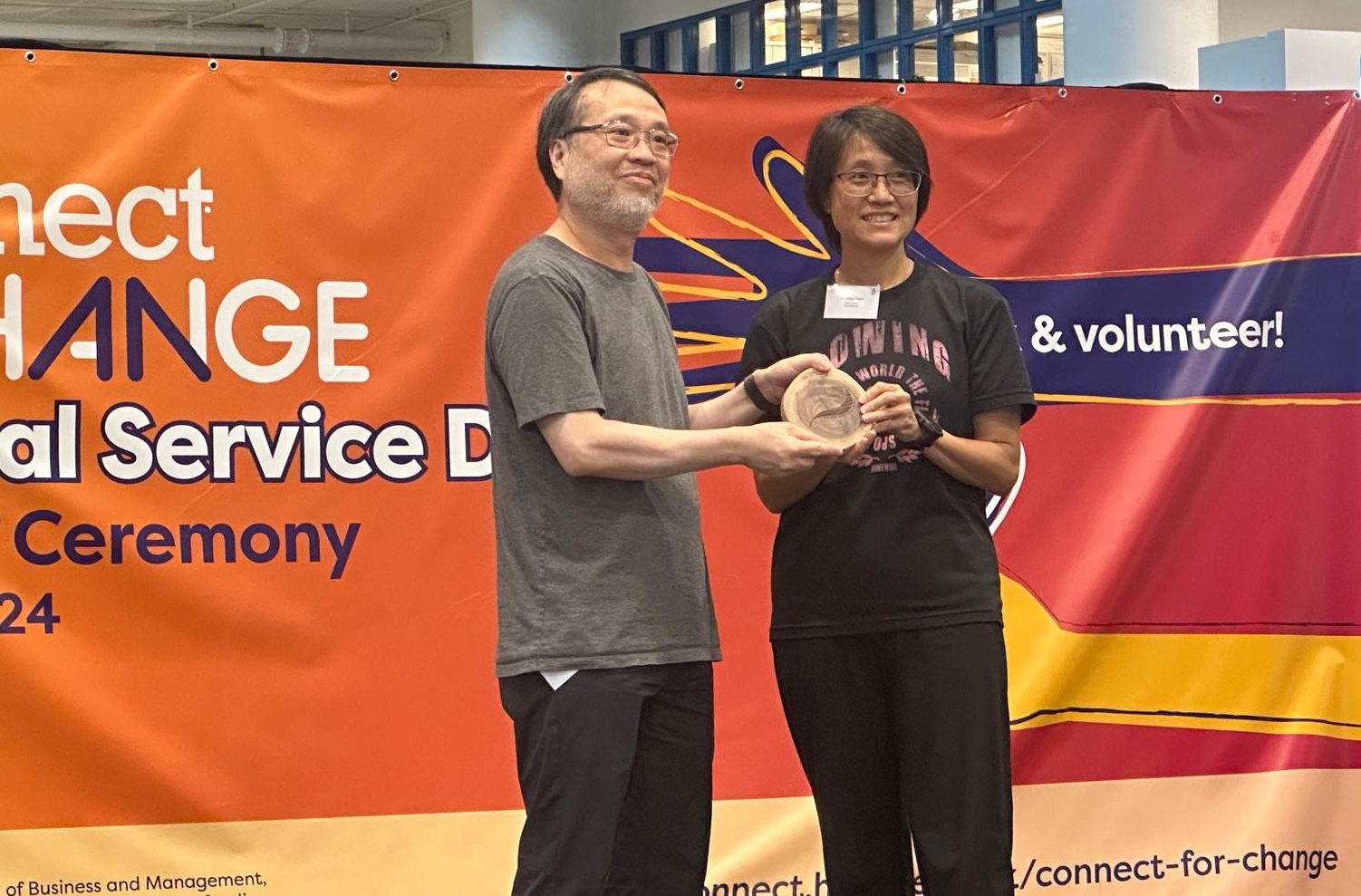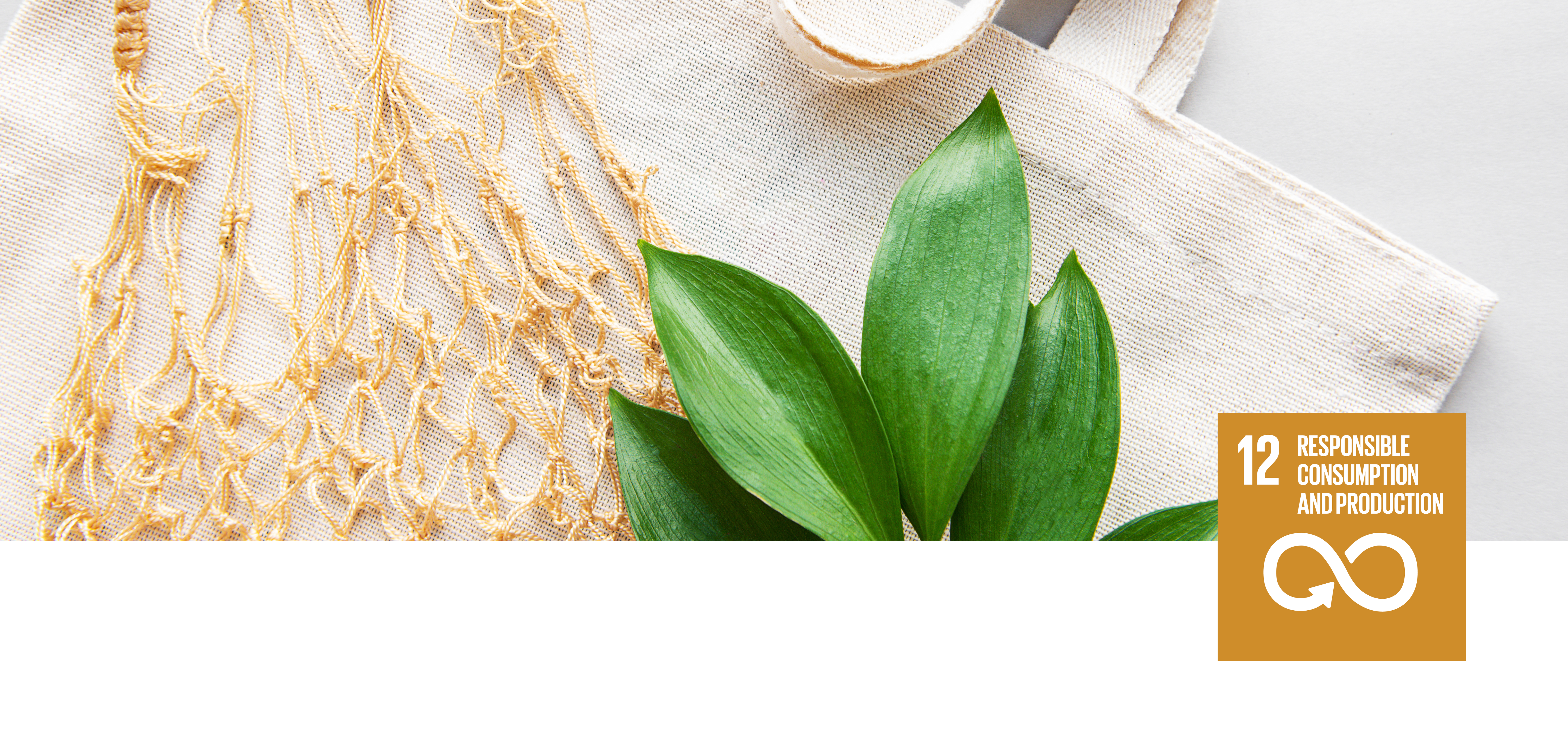
SDG 12: responsible consumption and production
HKUST values the importance of the environment and encourages our community to have an environmentally conscious approach in their consumption habits. We have developed policies for the sustainable sourcing of materials and reduction of disposable one-time use items on campus, programs for waste disposal tracking, recycling, and plastic reduction have also been implemented. Through our curriculum, research projects and community campaigns we aim to raise awareness and practical improvements that our stakeholders can take, encouraging community involvement in sustainable consumption.
Curriculum
80 related courses were offered in the 2023-24 academic year.
Research
According to Science Direct, from 2020 to 2024, HKUST published 326 research papers addressing SDG 12.
23.62% of them are in the top 10% cite score and 72.8% are internationally co-authored.
Research Highlights
Food Waste Analytics And Visual Feedback For Benchmarking And Behavior Changes
The project is an intelligent system used to study the food waste behaviors and analyze food consumption and waste patterns in the canteens at HKUST. The primary objective is to derive accurate information about the quantity and temporal pattern of food waste for different food categories, as well as other relevant food waste patterns in our dining halls. Based on such information, the system will then closely monitor the trend and further identify and implement active mechanisms to encourage food waste reduction efforts.
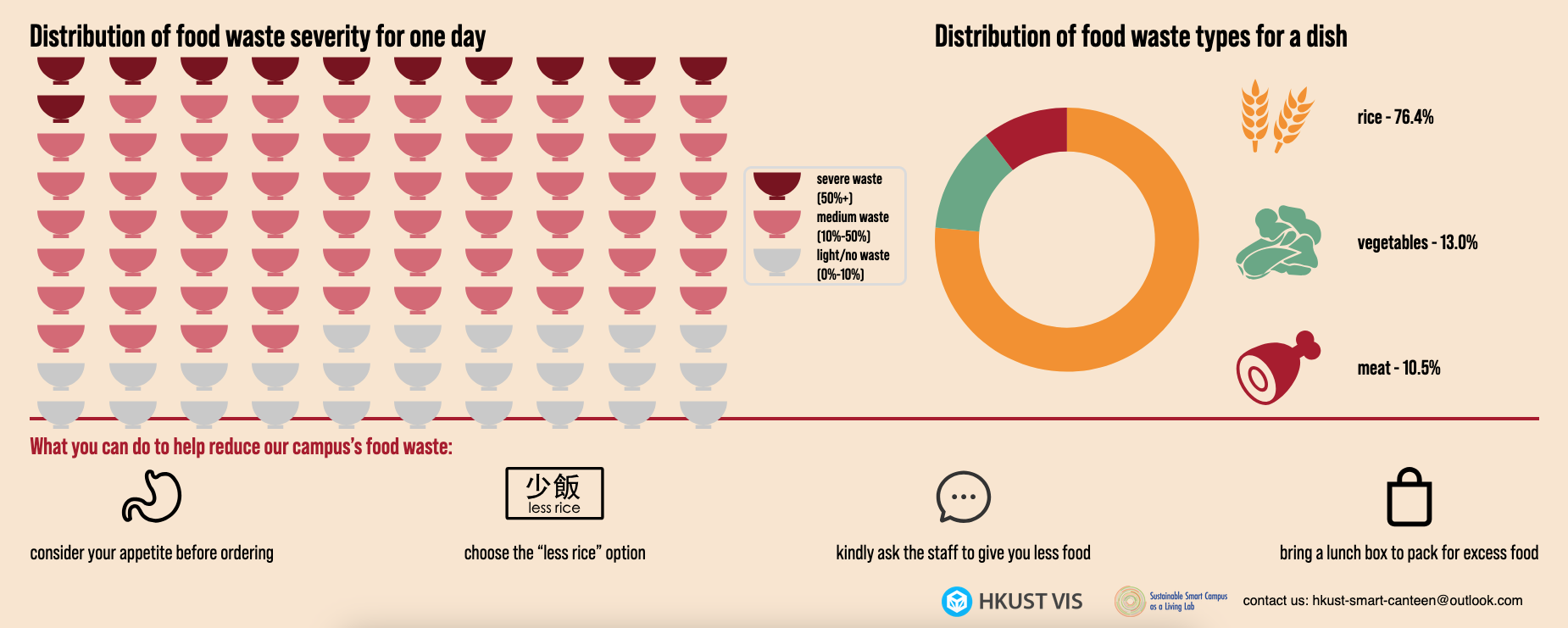
Upcycling Yard and Food Wastes into New Resources: Hydrochar for Supporting HKUST Greening
A sustainable way to deal with food and yard wastes by converting them into hydrochar, which is a high quality resource that can be used as a soil amendment agent for carbon sequestration, improving soil quality, plant health and ecological restoration.
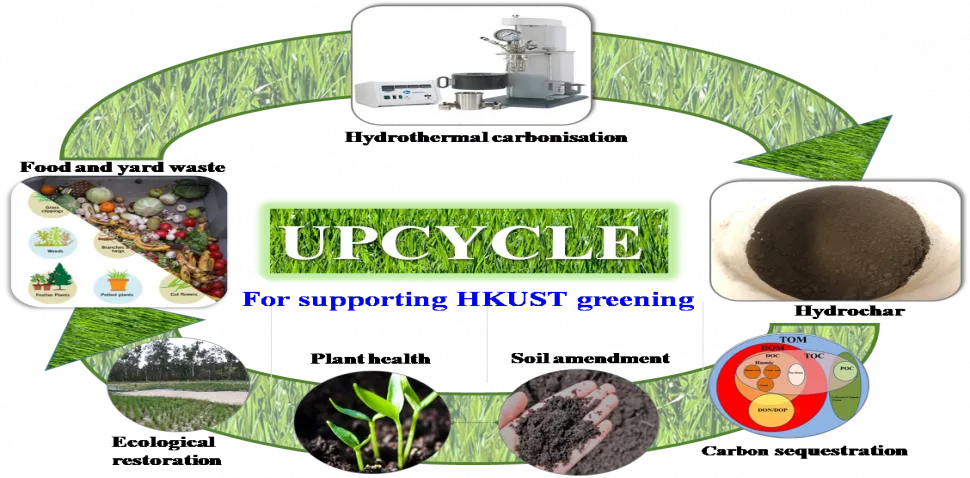
Turning construction and Ca-food wastes into new sustainable geological materials by CO2 sequestration
This project aims to explore the feasibility of mixing construction waste with Ca-rich food waste for inducing formation of binders in order to bind and strengthen the wastes for engineering applications, especially for pavement construction and slope stabilization on campus.
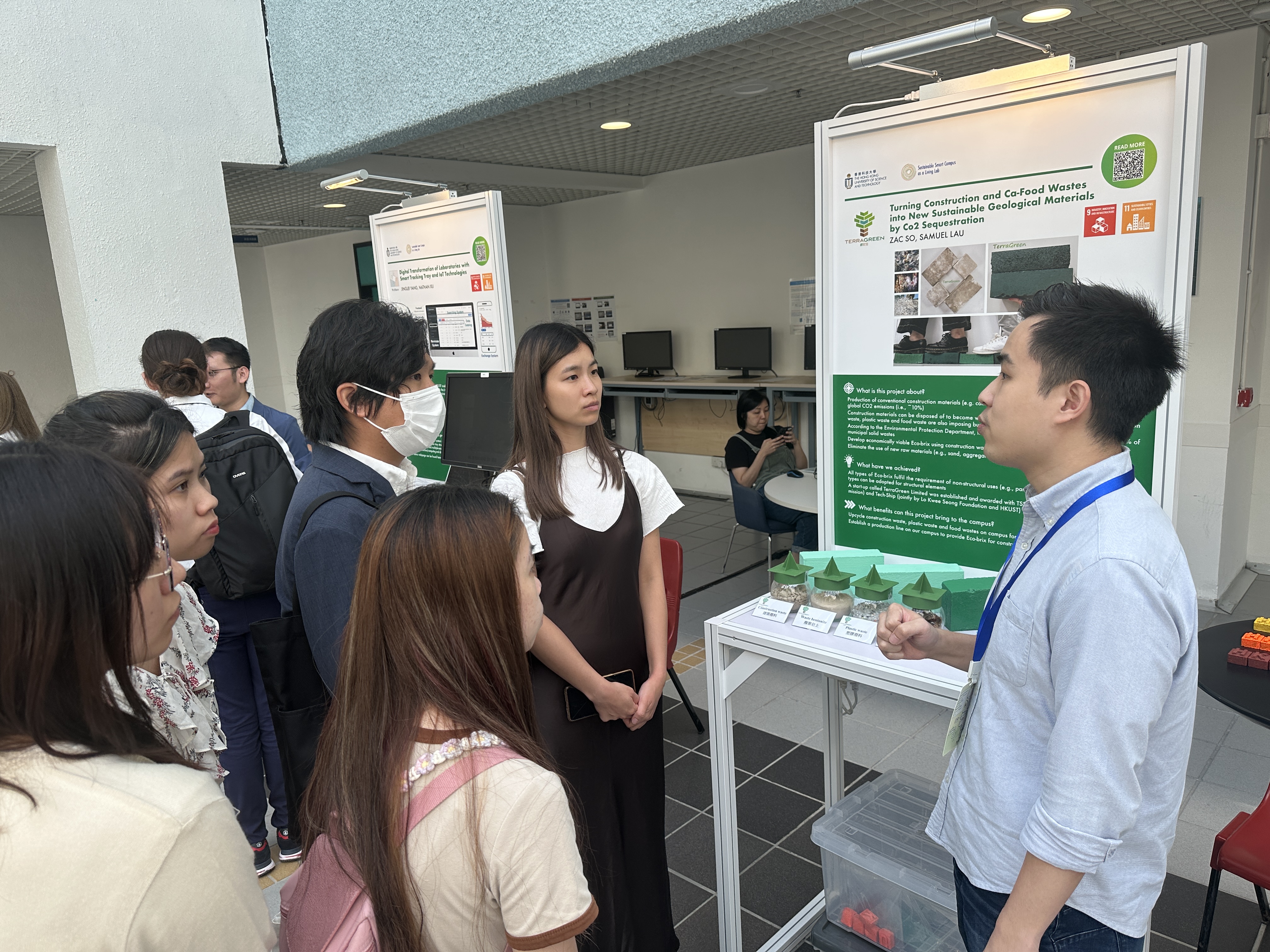
Sustainable Smart Marine Grid (SSMG) - Solar-powered base stations for continuous underwater surveying and trash cleaning
The Sustainable Smart Marine Grid (SSMG) project is a unique initiative that combines continuous underwater surveying, trash cleaning, and data collection. This innovative approach helps study the local marine ecosystem and actively contributes to its conservation by removing marine debris.
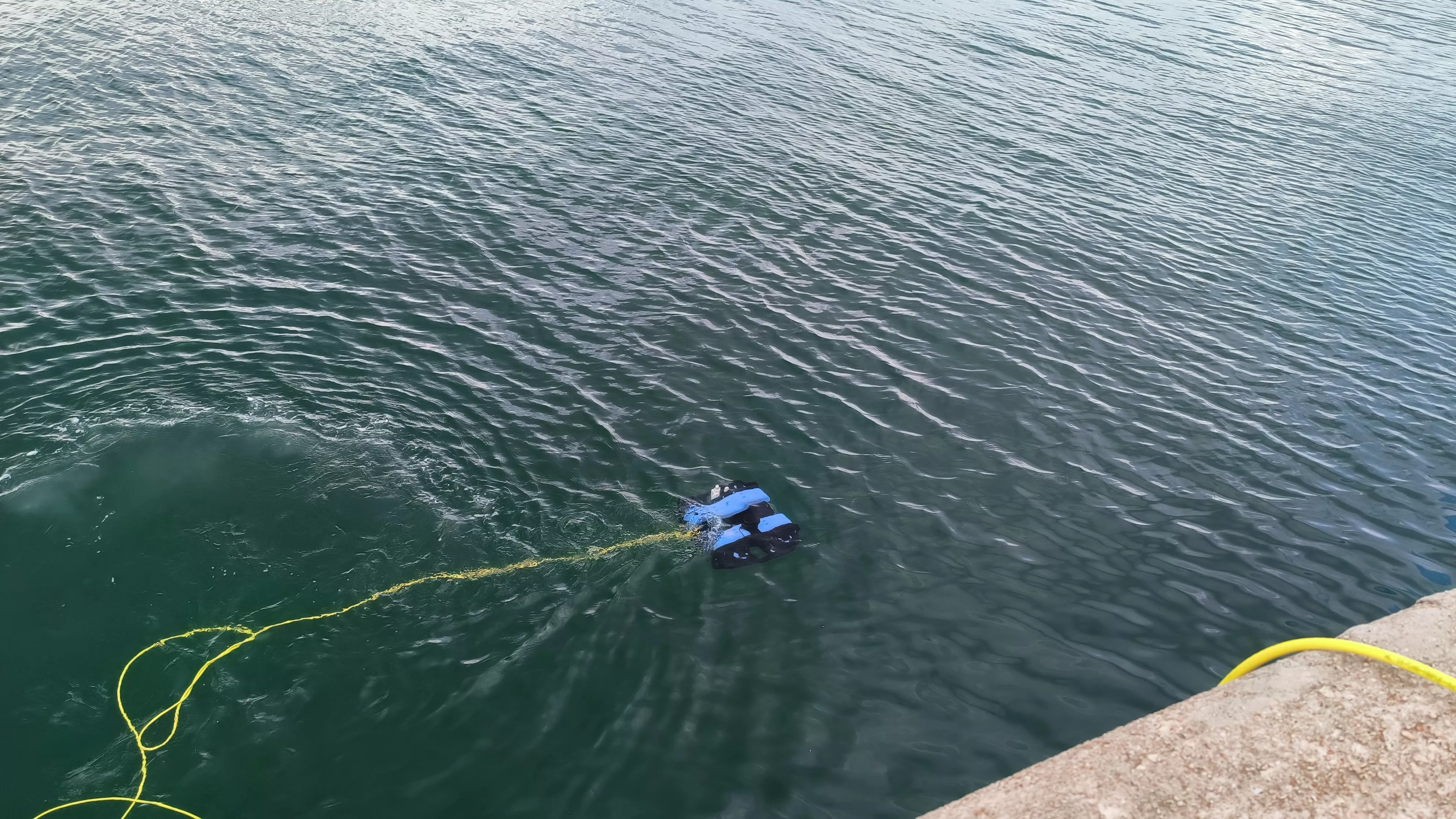
Policy
Guidelines for Green Office Operations
The operation of department and staff offices must abide to HKUST Sustainability Guideline which outlines the required involvement of each department in the Sustainability Network to ensure smooth adoption. All equipment and appliances such as photocopiers, printers, dispensers and air conditioners on campus are EMSD Level 1 performance level or at least ENERGY STAR-recognized to ensure most energy efficiency. The HKUST Purchasing Office (PURO) recently renewed the operational Guidelines on Sustainable Purchasing showing its commitment to stricter authorization of office purchase requests by “greening” the campus’ supply chain.
DGuidelines for Hazardous Waste Disposal
All departments operating under HKUST must comply with regulations relating to the appropriate disposal of hazardous waste—from its identification to the specific procedures outlined by the HKUST Health, Safety and Environment Office (HSEO). These measures are in place to ensure sustainable and responsible consumption and waste management.
Guidelines for Sustainable Procurement
Net-Zero Carbon Consideration for Capital Projects prioritize the use of locally-sourced, recycled and overall low-carbon options through the targeting of green building certification such as BEAM + and LEED. Additionally, HKUST preferentially selects suppliers with ISO14001 environmental management certification or equivalent as well as requirements for them to disclose Environmental, Social and Governance (ESG) data including carbon footprint, resources consumption, fair labor practice etc.
All purchase requests made by suppliers and contractors must comply with the HKUST Sustainable Purchasing Requirements for Suppliers and Contractors, including adherence to the Green Procurement Checklist, to ensure the lowest environmental impact and the highest usable product lifespan in the long run.
Minimising Plastic Use
The ban of single-use bottled water on campus since 2018 removed the sale of single-use plastic bottled water of 1 Liter or less. Offices and departments are encouraged to eliminate disposable bottles at meetings and events, opting for reusable alternatives. By promoting sustainable options, HKUST seeks to reduce plastic waste and promote a culture of environmental responsibility.
Municipal Solid waste Charging Scheme
Despite the Hong Kong Government's announcement to defer the implementation of the Municipal Solid Waste (MSW) Charging scheme, which aims to achieve waste disposal reduction through behavioral changes, HKUST proceeded with the scheme to share waste management costs based on the "Polluter Pays" principle. Starting from April 1, 2024, the scheme was introduced across 107 offices on the main and LSK campuses, 800 laboratories spanning 34 departments, and 13 student halls. Additional fees will apply for extra requests for plastic bags and bulk disposal of landfill waste. To prevent unauthorized dumping, most indoor and outdoor trash bins have been removed.
Single Use Plastic Removal
On April 22, 2024, Hong Kong implemented the first phase of the Regulation on Disposable Plastic Products. This proactive measure aims to mitigate the detrimental impact of single-use plastics on the environment and encourages individuals and businesses to adopt more sustainable alternatives. To comply with this regulation, the University has banned single-use plastic items, including utensils, plates, and straws for both dine-in and takeaway meals from 19 catering outlets. At this stage, only dine-in meals will be banned from using single-use plastic containers, cups, and their lids. Additionally, toiletries in the Conference Lodge, such as toothbrushes, sanitary bags, vanity kits, sewing kits, and combs, now utilize bamboo-based and paper-based materials.
Collaboration
HKUST and King’s Flair Establish Joint Laboratory to Strengthen Innovative Research on Sustainable Technologies
The Hong Kong University of Science and Technology (HKUST) and King's Flair Development Limited (KF) celebrated the inauguration of the “HKUST-KF Joint Laboratory for Sustainable Technologies” (Lab). The laboratory will collaborate to explore research and applications in the areas of sustainable technologies, specifically on modified plastic materials to enhance their usability, expand applications, improve functionality, and create new variations. Examples of potential creations include durable transparent self-cleaning nano-coatings, antibacterial plastic materials, and new materials such as superhydrophobic and oleophobic detergent-free plastics for kitchenware. These advancements not only widen the application of plastic materials but also extend their lifespan, minimizing environmental impact and reducing reliance on petrochemical materials.
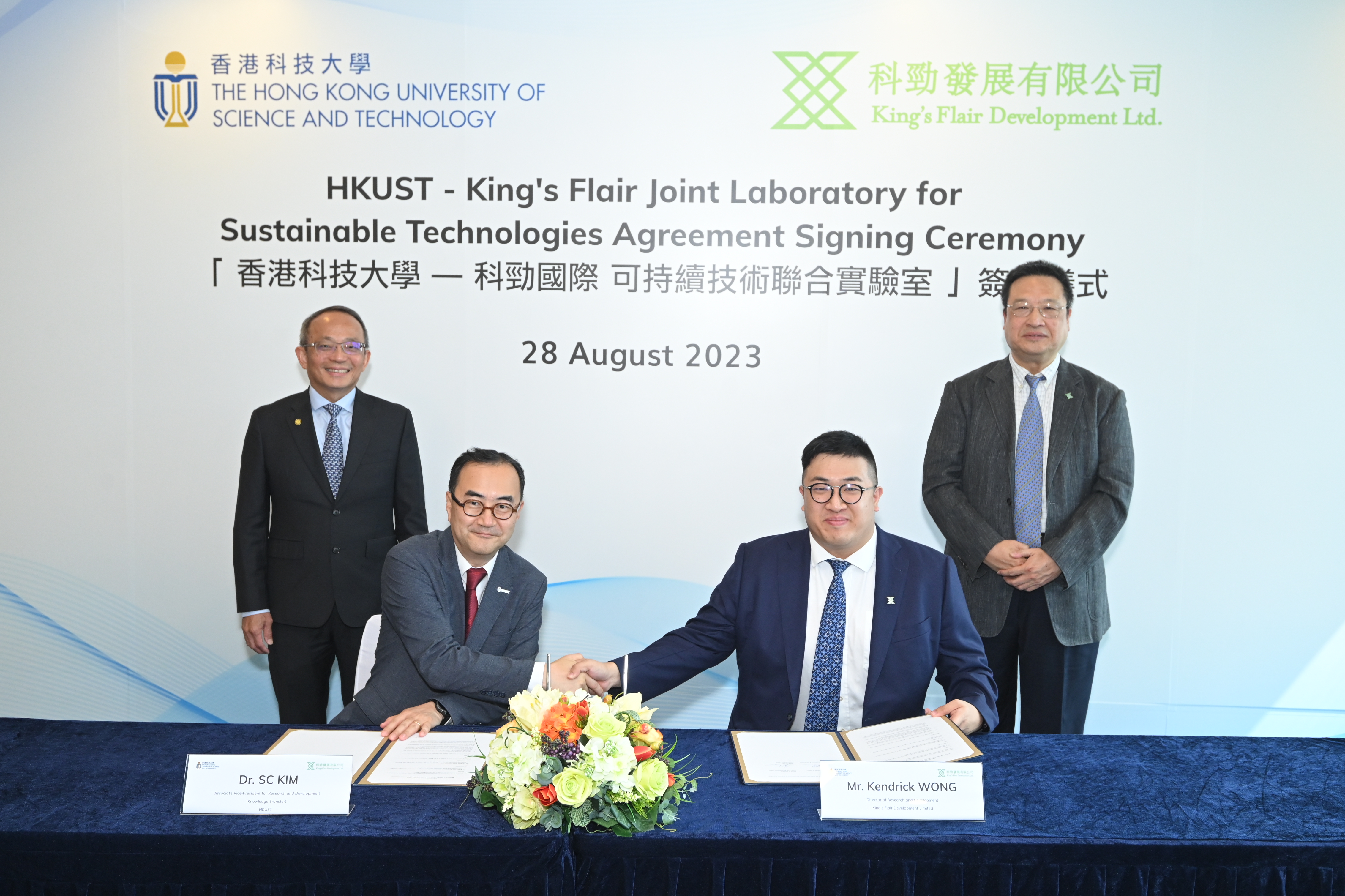
HKUST and KF representatives sign an agreement to establish a joint lab for sustainable technologies.
Hong Kong Sustainable Campuses Consortium (HKSCC )
With the signing of the Hong Kong Declaration, all the eight publicly funded universities including HKUST, joined hands to form the Hong Kong Sustainable Campus Consortium (HKSCC) in 2010. It engaged government and local leaders on pressing waste, energy, and GHG issues to drive a more efficient resources consumption.
Community Engagement
FLIP THE CHANGE: REDUCE SINGLE-USE CUPS AND BYO!
Hong Kong took a major step to reduce waste on Earth Day, 22 April 2024—prohibiting the sale and distribution of single-use plastics and styrofoam food containers and for dine-in purposes. To encourage responsible consumption habits and celebrate Earth Day, the HKUST Sustainability/Net-Zero Office ran the ‘Flip the Change’ campaign in late March and invited Muuse to pilot a reusable cup lending program on campus from 22 April for a week. The campaigns together engaged around 500 community members take part in pledging to “BYO”—bring their own—and ‘flip the change.’
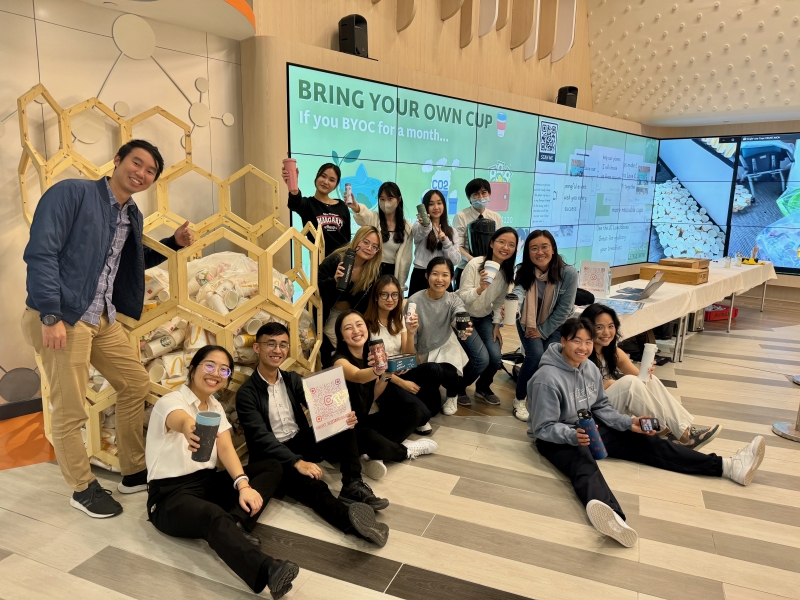
Stich Together Program 2023-2024
The Stitch Together Program 2023-2024, led by HKUST Connect and INNOTIER, is dedicated to repurposing and upcycling used antimicrobial fabrics (Ionic+™ fibers) to benefit the community and promote sustainability in Hong Kong. In the Fall term, they designed oversleeves for street cleaners to provide added protection during their work and wheelchair organizers for wheelchair users, enhancing convenience and accessibility. These products are finally mass produced and distributed to street cleaners and wheelchair users in the Spring Term during Global Service Day 2024. This program not only contribute to a more sustainable future but also makes a positive impact on the lives of the target recipients.
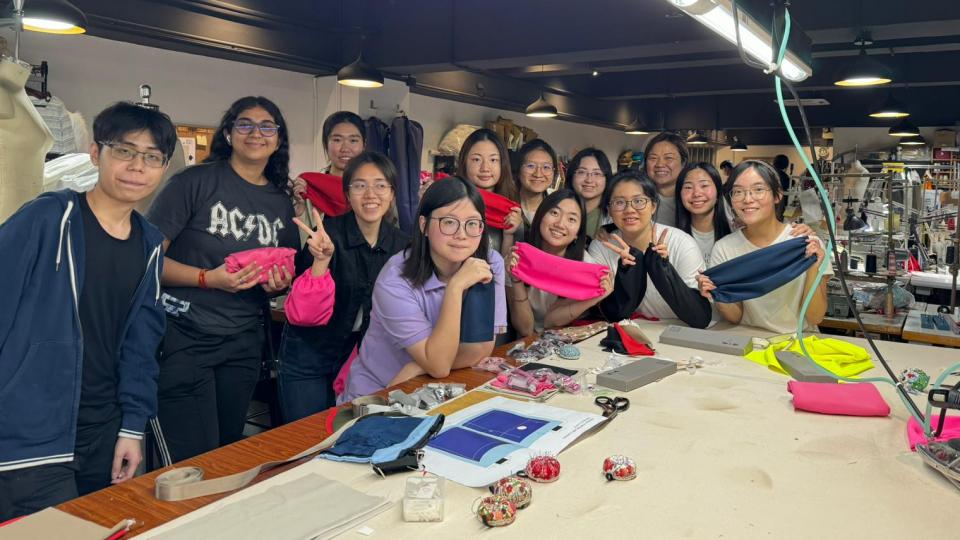
Garage Sale
In the 2023/24 academic year, the long-standing annual Garage Sale and Market returned to the HKUST campus.
These events attracted over 200 community members selling second-hand items, including clothing, toys, children’s books, handicrafts, and appliances. Several charities and vendors promoting upcycled and green products were also invited to participate.
With the theme of “Zero Waste,” the events encouraged the sale and reuse of second-hand items to prevent them from ending up in landfills. All participants were asked to use their own reusable food containers to enjoy the food provided.
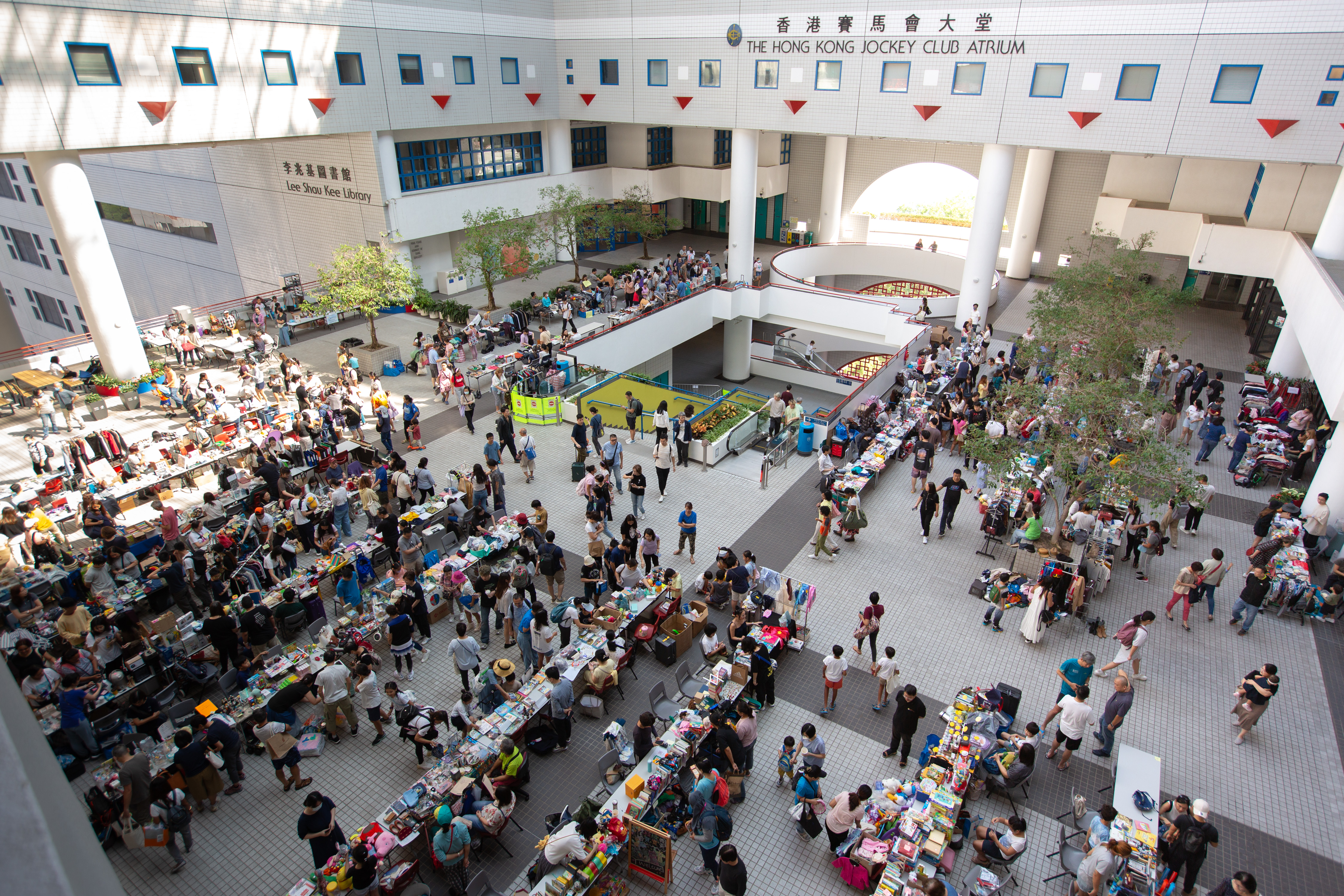
Sustainability Leadership Programme 2024
In Spring 2024, 11 HKUST students participated in the JCSCCP’s Sustainability Leadership Programme, joining a cohort from seven other universities for leadership training focused on issues of overproduction and overconsumption in the clothing industry, both locally and globally. After learning from local circular fashion experts, the student teams were tasked with developing and delivering projects that promote clothing circularity within their respective campus communities—specifically, finding ways to collect, sort, and redistribute clothing while encouraging circularity and responsible consumption.
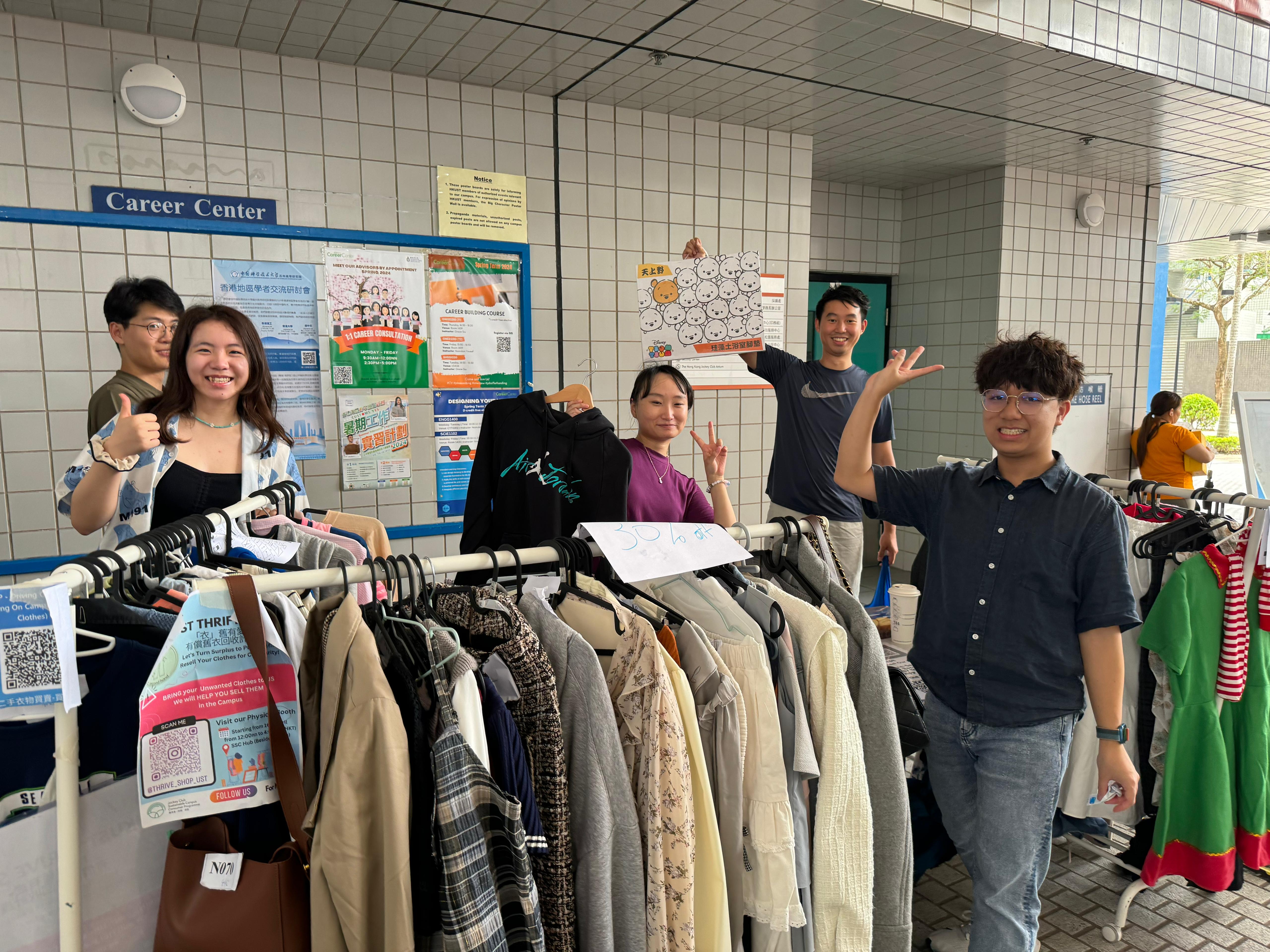
Operation
Waste Generation and Recycling Overview
The 2023/24 year saw some improvement in HKUST’s landfill waste, as it decreased by 4.2% compared to the previous year, despite the almost complete resumption to face-to-face activities. Landfill waste generation for this year is also 47.3% less than the baseline year, 2014, and 2.1% less than the lowest pre-pandemic figure in 2019/20. The total recycling figure slightly decreased by 6.5% compared to the previous year, but it is still 8.6 times higher than the baseline year. Since the start of the pandemic in the 2020/21 year, the University has continued to display its commitment to recycling, and this is observed through the recycling at least 1,031.5 tons or more since that year.
The University has been recycling 15 types of recyclables including, but not limited to paper, metal, plastic, glass, food, animal bedding, landscape, wood, and electrical appliances. HKUST will continue to pursue meeting and maintaining the 2020 Challenge Target of eliminating 50% of the baseline amount of waste to the landfill. Moreover, the university is ambitiously working towards meeting the HKUST 2028 Sustainability Target of diverting 75% of waste away from the landfill.
HKUST Pilots Smart Wast Measures to Promote the Development of Sustainable Campuses
The Hong Kong University of Science and Technology (HKUST) has successfully tested out a carbon reduction measures — an Artificial Intelligence-driven (AI) Reusable Meal Container Lending System which allows the reduection of disposables by providing access to reusable lunchboxes to HKUST.

The AI Reusable Meal Container Lending System utilizes internal cameras and AI Object Recognition software, which allows users to borrow and return containers simply by tapping their Octopus Card.
Zero Plastic Takeaway Container Pilot Program
With over 15,000 takeaway containers consumed weekly on campus, many of these are made with plastic lining or biodegradable plastic, which are difficult to decompose. To promote a 'plastic-free' approach at the source, plant fiber-made takeaway food containers have been introduced in participating restaurants as part of the Pilot Program.
Following the success of Phase I of the Pilot Program, which saved over 20,000 plastic disposables, the University collaborated with five new catering outlets in Fall 2023 to further reduce waste sent to landfills. Over 130,000 zero-plastic takeaway containers were ordered, marking a successful preparation for the plastic ban by the Hong Kong Government.
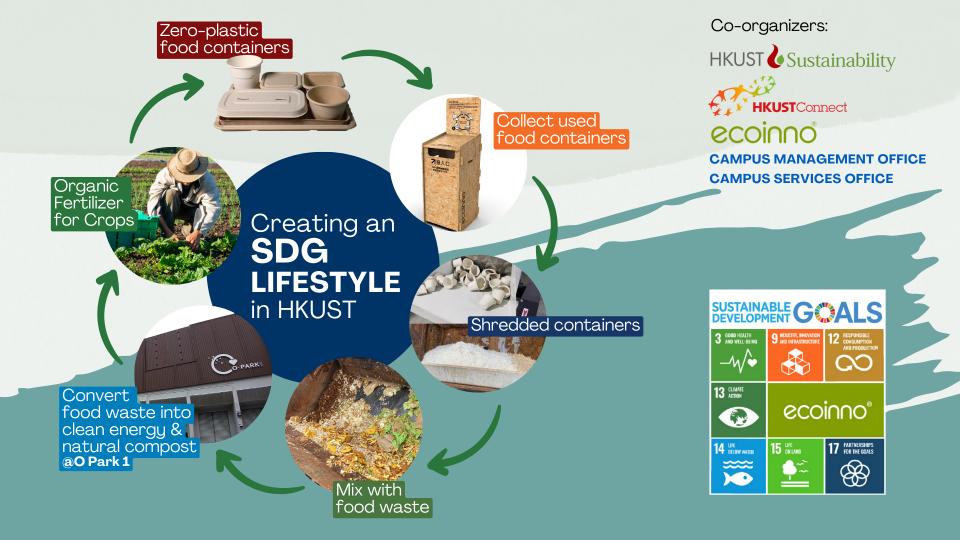
Wood Reuse
The much-loved mature Acacia tree grove across from Shaw Auditorium made way for the construction of the new Martin Ka Shing Lee Innovation Building in late 2022. At the start of 2024, campus users can begin to appreciate the beauty and heritage of these beautiful trees in their new forms on campus at the newly renovated Student Center interior works, furniture at the HKUST offices, acknowledgement plaques around campus, and other installations. HKUST won the International Sustainable Campus Network's 2024 Best Practices Report Award for this "Campus Trees to Reduce Embodied Carbon in New Construction" project.
Together with more wood recycled from felled mature Acacia confusa trees of the Senior Staff Quarters, our wood resources have now been expanded. The latest form takes the shape of customized souvenirs that can be offered to speakers, guests and partners, as a token of appreciation for their invaluable contribution.
